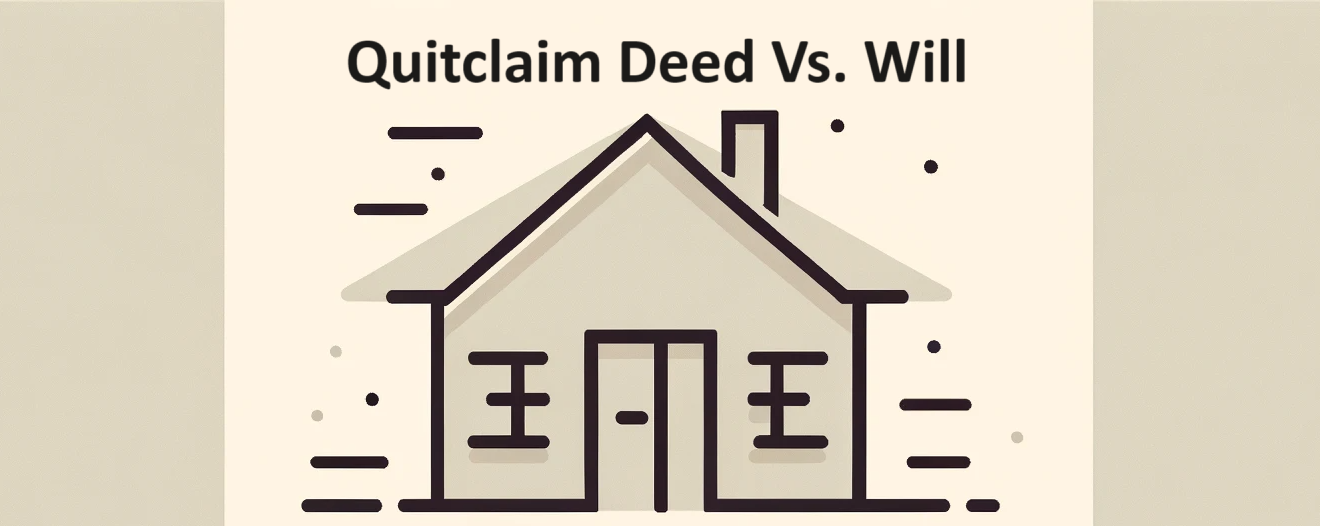
Real Estate Deeds Made Easy Since 1997 – Deeds.com
-

Usually, the quitclaim deed overrides the instructions in a will. But the devil is in the details. At age 60, Letitia bought her Sacramento home, as a sole owner. Twenty years later, aged 80, Letitia went into a care home.…
-
Notaries Go Remote: A Digital Shift Is Changing Notary Language
Next time you use a notary, your certification might look a little different. Notary statements on documents have changed over the last year, amidst a rush to adopt digital notarizations. Today’s notarial certificates often explain whether the notarization was done…
-
How a Sudden Disaster Impacts Your Mortgage Loan
As co-insured parties, you and your mortgage lender both have a stake in the value and condition of your home. Your stake in your property value is obvious. But the lender also has a vested interest. Your home’s value is…
-
Selling a Probate Property in 6 Steps: Practical Tips for Beneficiaries
Selling a probate property is a study in patience. It’s important to let probate run its proper course. The goal of this court-supervised process is to pay the estate’s debts, and to make sure the deceased person’s chosen beneficiaries receive…
-
You Can Buy a Tesla with Bitcoin. How About a House?
Tesla will accept your Bitcoin when you buy your new self-driving car. Taking note, Realtor.com looked around — and yes, there are home sellers accepting cryptocurrency, too. Most of the homes that can be purchased with Bitcoin are in Florida,…
-
Mortgage Approvals: The New Landscape for Post-Pandemic Home Buyers
It’s now obvious: the mortgage lending industry is forever changed. Here’s what happened — and what’s likely to come next. The Year of Minimum-Risk Lending Back in April 2020, we noted that mortgage lenders were getting tougher on loan applicants.…
-
Types, Titles & Taxes: What to Know Before You Buy a Mobile Home
Mobile homes are popular choices throughout the United States. They’re popular in Pennsylvania, big news in Florida, and in high demand across the southern, western, and midwestern regions of the country. They’ll likely do very well in the months ahead.…
-
Buying a Fixer-Upper: What Are the Best Financing Options?
So, you’ve found a diamond in the rough. After major renovations, it will be the perfect home for you. What kind of financing will you need to make it happen? There are several ways to go here. Let’s check out…
-
For Home Sellers: Capital Gains Tax 101
Many people sell their homes for more than they cost in the first place. If you are in this fortunate situation, and your home has appreciated in value, you could be required to pay capital gain taxes — not on…
-
Solving Title Problems for a Home with a Previous Foreclosure
A foreclosure usually means a previous owner fell into default on the mortgage. When there’s an unpaid mortgage debt, the lender can put a lien on the property, and ultimately claim the property itself. Foreclosures can also happen due to…
-
Rising Stars in Construction Tech: 3D Printed Houses
3D printing technology, which applies robotic automation to materials, is making some notable inroads. Let’s take a brief tour of what’s out there. From the East Coast… Recently, a 3D printed house in New York was listed for about $300,000…
-
All About Escrow
How Escrow Helps Home Buyers—And When It Hurts Through an escrow arrangement, a neutral go-between holds onto documents or collateral while a transaction is underway. Escrow providers usually charge the parties a fee to accept and hold the assets, redistribute…
-
What’s the Latest on Covid Mortgage Relief?
The American Rescue Plan, accompanied by $1.9 trillion in stimulus funding, includes $10 billion in mortgage payment relief for homeowners affected by the massive workforce disruptions of 2020. Still more funding is marked to help homeowners get back on track with…
-

Using a Quitclaim Deed: Top 5 Reasons
Are you considering using a quitclaim deed? It’s a fast, simple, and reasonable way to transfer home ownership. It’s a good choice in certain situations. What are those certain situations? In contrast to warranty deeds, which are most often used…
-
Race Restrictions Still Appear on Deeds. There’s a Movement Afoot to Delete Them.
Imagine the shock of reading your deed carefully and finding this rule: “This property shall not be resold, leased, rented or occupied except to or by persons of the Aryan race.” The Seattle-based Windermere Real Estate company doesn’t want to put up with…

